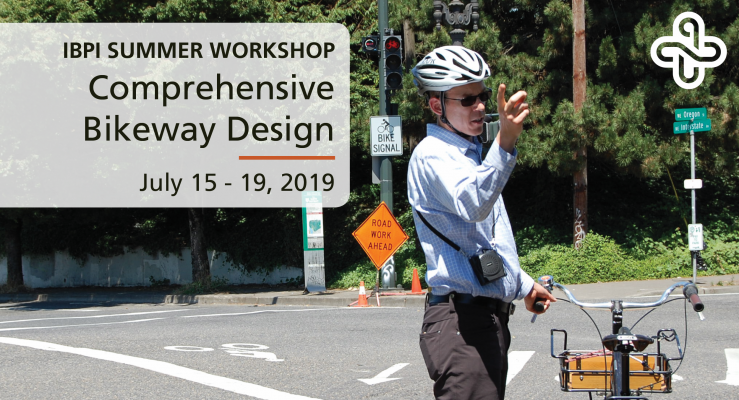
This summer we're hosting two workshops through our program, the Initiative for Bicycle and Pedestrian Innovation (IBPI). Learn about the other: Integrating Bike-Ped Topics into University Transportation Courses (June 20–21)
COURSE OVERVIEW
As communities have put bikeway plans into effect, we’ve learned what works and what doesn’t -- how to plan effectively, design correctly and make investments that get results. We’ve distilled those lessons into this course, which covers the fundamentals of bikeway design and planning through an intensive week of interactive classroom, field tours, and design exercises.
Instructors draw from their years of experience, along with project examples, to highlight practical applications of the principles and techniques covered. The pioneers and leading practitioners in the field will teach the fundamentals of bikeway planning and design through an intensive week of classroom sessions and tours. The instruction and interaction with other participants will bring you up to speed on innovative practice and research and teach you the skills and techniques you need to get started on your next project.
Over the years, the Portland area has implemented numerous types of innovative bicycle facilities and treatments, providing a unique “living laboratory” to study. Daily field tours provide first-hand experience with these facilities and projects discussed in the classroom. These tours showcase not just the operational qualities but also how bikeway planning affects community livability and economic development. See photos of last year's workshop, and of previous years.
Upon completion of the course, participants will be able to:
- Make low-risk investments in proven bicycle plans and facilities
- Select the appropriate bicycle facility design based on urban form, traffic conditions and multimodal context
- List the different ways that a bicycle facility can meet or not meet the needs of people who bike
- Use the FHWA Experiment process to test innovative bikeway design
- Describe the tradeoffs of designing better facilities to accommodate all road users
- Identify various options for treating intersections that incorporate bicycle facilities
- Describe the health benefits of active transportation
- Identify opportunities, strategies and programs to encourage more people to bike and walk
- Talk to an engineer and communicate effectively with them about facility requirements
- Build their personal network with experts from the various facets of bikeway design
- Feel rejuvenated and excited to go back to work and make an impact!
AGENDA
| MORNING | MIDDAY | AFTERNOON | |
MON | Introductions + Orientation Field Tour: Bicycle Facility Design - The Good, The Bad, The Ugly | Setting the Context for Bicycle Facility Design | Facility Design: Bicycle Boulevards Evening: Ride and Social Hour |
| TUES | Field Tour: Bicycle Facility Design - A Low Stress Network | Innovation in Bicycle Facility Design: Network Approach and Protected Bike Lanes | Innovation in Bicycle Facility Design (cont.) |
| WED | Field Tour: Traffic Engineering - The Bike Edition | Traffic Engineering Techniques in Support of Active Transportation: Intersections, Signals, and Other Principles | Request to Experiment: Evolving Guidance and Standards in Bikeway Design |
| THURS | Designing for Suburban Environments | Field Tour (Washington County): Bicycling in a Suburban Environment | Multimodal Integration: Making the Transit and Bike Connection |
| FRI | What Design Problems Are You Challenged By? Reflection: Applying Lessons Learned & Takeways | Closing Lunch and Conversation (ends at 1 PM) |
INSTRUCTORS
Nick Falbo, Senior Transportation Planner, City of Portland
Roger Geller, Bicycle Coordinator, Portland Bureau of Transportation
Drusilla van Hengel, Principal, Nelson Nygaard
Hau Hagedorn, Associate Director, Transportation Research and Education Center, Portland State University
Peter Koonce, Division Manager, Signals & Street Lighting Division, City of Portland
Shelley Oylear, Transportation Engineer and Planner, Washington County, Oregon
WHO SHOULD ATTEND
Transportation engineers, urban planners, advocates, policymakers, municipal staff and other transportation professionals interested in nurturing cycling in their communities. Students must be able to bike up to 10 miles a day, and expect mild elevation.
REGISTRATION
Register here. The $1200 fee includes light breakfast, lunch, course materials and standard bike rental. Electric-assist bicycles can be rented separately through the Bike Hub for an extra fee.
REFUND POLICY
Need to modify or cancel your registration? Email us at asktrec@pdx.edu. Refunds are available through Monday, June 14, 2019 less a $100 service fee. The registered participant may invite another person to substitute their place in the workshop at any time at no charge.
CONTINUING EDUCATION CREDITS
This 5-day workshop is eligible for approximately 30 hours of training which equals to 30 CMs or 30 PDHs, and will be submitted for AICP credits (see our provider summary here). We will provide an attendance certificate to those who need to document their professional development hours.
ACCOMMODATIONS
For those wishing to stay off campus, we can recommend some nearby hotels and tips for getting around town. Air B&B is another potential source to find a comfortable place to stay. Budget option: Participants in this workshop are eligible to register for on-campus housing in basic, dormitory-style rooms.
Requests for reasonable accommodations may be made to Conference & Events Office, (503) 725-CONF, email: conferences@pdx.edu or the Disability Resource Center, (503) 725-4150, e-mail: drc@pdx.edu. In order to ensure that reasonable accommodations can be provided in time for this event, please make your requests as soon as possible.

The Transportation Research and Education Center (TREC) at Portland State University is home to the National Institute for Transportation and Communities (NITC), the Initiative for Bicycle and Pedestrian Innovation (IBPI), and other transportation programs. TREC produces research and tools for transportation decision makers, develops K-12 curriculum to expand the diversity and capacity of the workforce, and engages students and professionals through education.
